Analysis of Legal and Taxation Issues in International Export
VerifiedAdded on 2022/10/12
|9
|1545
|437
Report
AI Summary
This report examines the key legal and taxation issues faced by Australian companies and individuals engaged in exporting goods and services. It delves into the importance of complying with Australian and international trade laws, including bilateral sanctions and United Nations Security Council sanctions. The report emphasizes the need for Intellectual Property (IP) registration and outlines the process, including international agreements. It highlights various issues impacting trade, such as patent registration, regulatory norms, contract disputes, and liability. Additionally, it explores international contracts, detailing essential information needed before entering an export contract. The report also covers taxation regulations for Australian residents, including reporting foreign income and claiming foreign tax credits. Furthermore, it discusses financial assistance programs provided by the Australian government, such as the Export Market Development Grant, Export Finance Australia, and Duty Drawback. Finally, the report concludes by summarizing the comprehensive nature of international export and the importance of adhering to legal, taxation, and financial guidelines, including the availability of government grants and subsidies to facilitate export market development.

International accounting
Paraphrase This Document
Need a fresh take? Get an instant paraphrase of this document with our AI Paraphraser
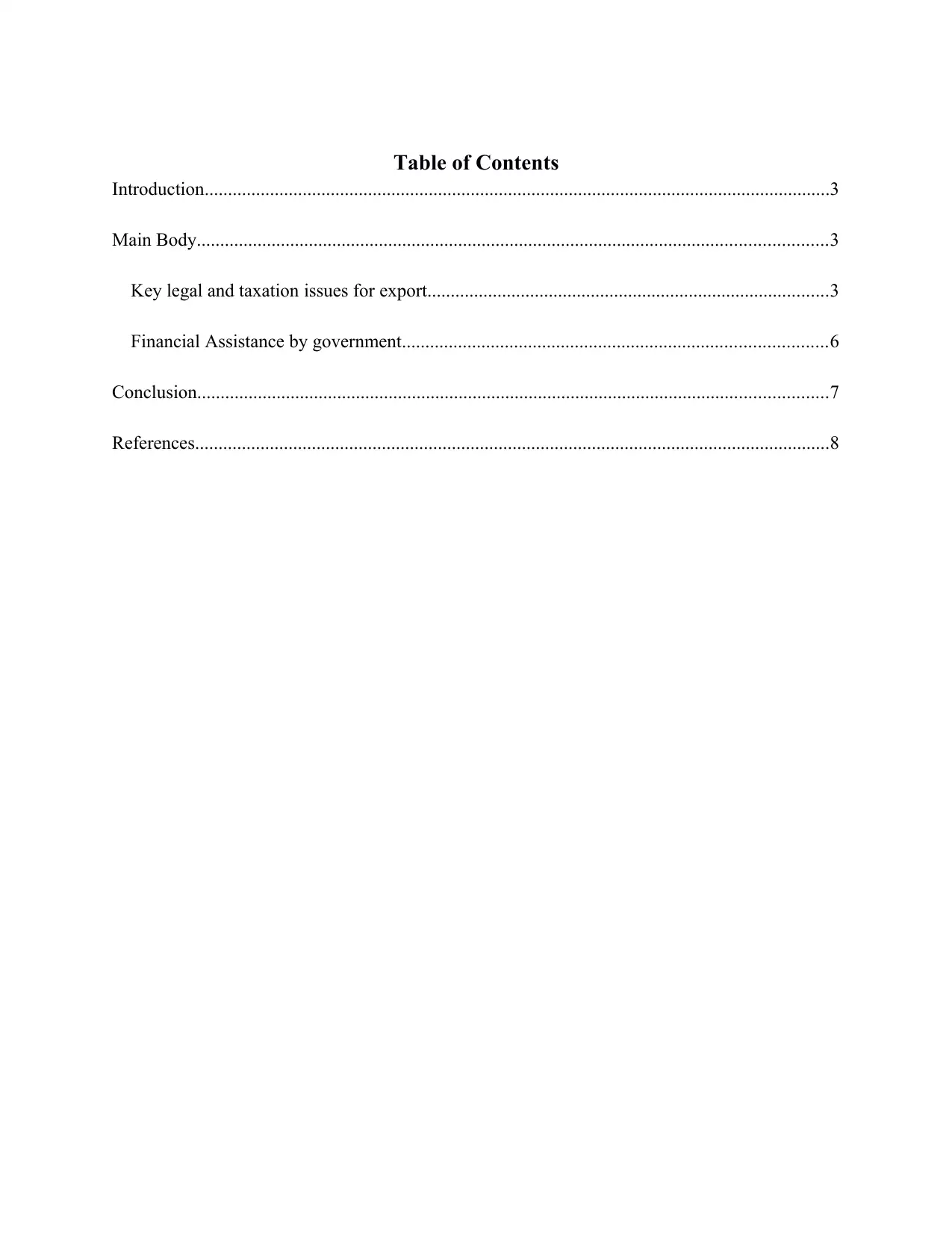
Table of Contents
Introduction......................................................................................................................................3
Main Body.......................................................................................................................................3
Key legal and taxation issues for export......................................................................................3
Financial Assistance by government...........................................................................................6
Conclusion.......................................................................................................................................7
References........................................................................................................................................8
Introduction......................................................................................................................................3
Main Body.......................................................................................................................................3
Key legal and taxation issues for export......................................................................................3
Financial Assistance by government...........................................................................................6
Conclusion.......................................................................................................................................7
References........................................................................................................................................8
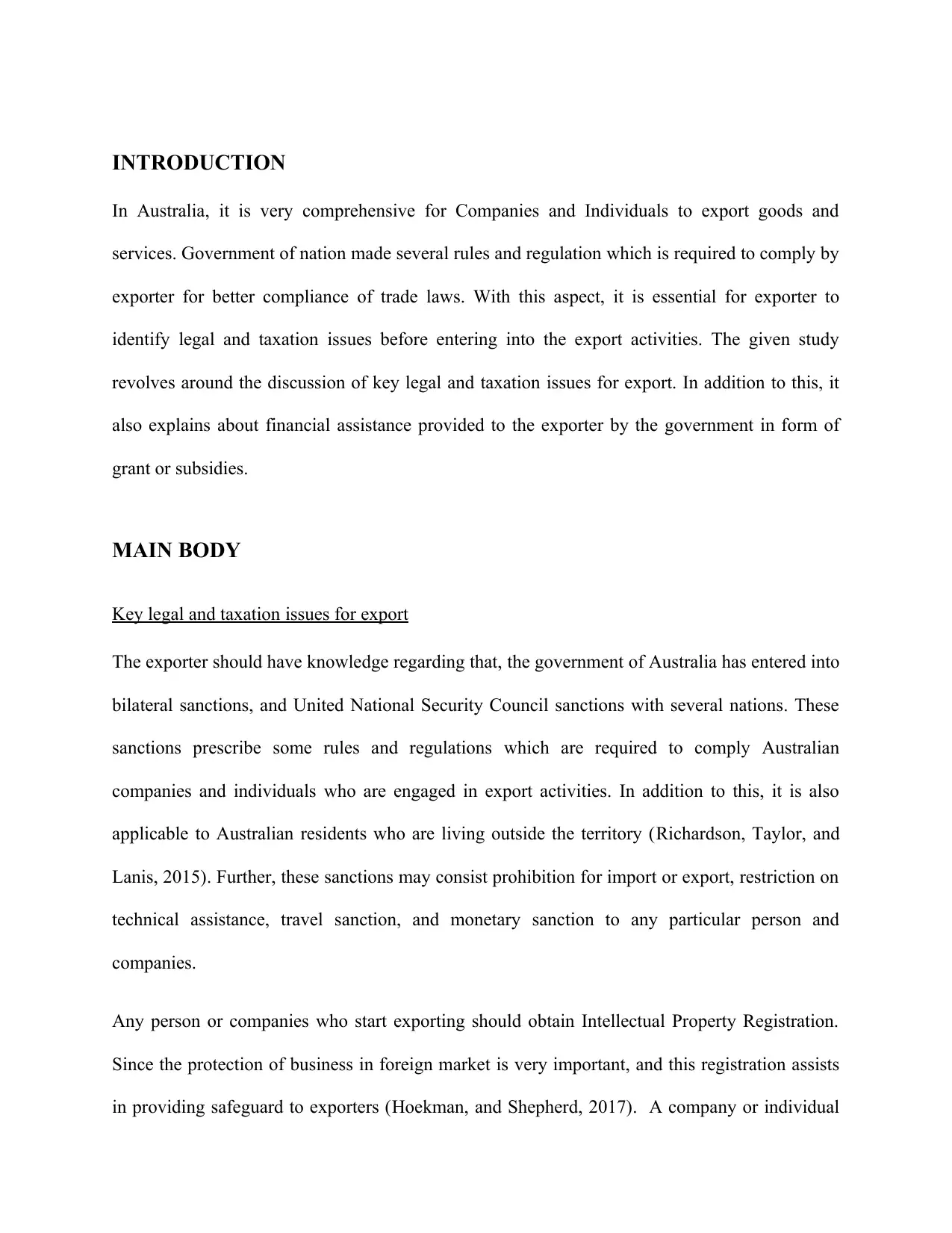
INTRODUCTION
In Australia, it is very comprehensive for Companies and Individuals to export goods and
services. Government of nation made several rules and regulation which is required to comply by
exporter for better compliance of trade laws. With this aspect, it is essential for exporter to
identify legal and taxation issues before entering into the export activities. The given study
revolves around the discussion of key legal and taxation issues for export. In addition to this, it
also explains about financial assistance provided to the exporter by the government in form of
grant or subsidies.
MAIN BODY
Key legal and taxation issues for export
The exporter should have knowledge regarding that, the government of Australia has entered into
bilateral sanctions, and United National Security Council sanctions with several nations. These
sanctions prescribe some rules and regulations which are required to comply Australian
companies and individuals who are engaged in export activities. In addition to this, it is also
applicable to Australian residents who are living outside the territory (Richardson, Taylor, and
Lanis, 2015). Further, these sanctions may consist prohibition for import or export, restriction on
technical assistance, travel sanction, and monetary sanction to any particular person and
companies.
Any person or companies who start exporting should obtain Intellectual Property Registration.
Since the protection of business in foreign market is very important, and this registration assists
in providing safeguard to exporters (Hoekman, and Shepherd, 2017). A company or individual
In Australia, it is very comprehensive for Companies and Individuals to export goods and
services. Government of nation made several rules and regulation which is required to comply by
exporter for better compliance of trade laws. With this aspect, it is essential for exporter to
identify legal and taxation issues before entering into the export activities. The given study
revolves around the discussion of key legal and taxation issues for export. In addition to this, it
also explains about financial assistance provided to the exporter by the government in form of
grant or subsidies.
MAIN BODY
Key legal and taxation issues for export
The exporter should have knowledge regarding that, the government of Australia has entered into
bilateral sanctions, and United National Security Council sanctions with several nations. These
sanctions prescribe some rules and regulations which are required to comply Australian
companies and individuals who are engaged in export activities. In addition to this, it is also
applicable to Australian residents who are living outside the territory (Richardson, Taylor, and
Lanis, 2015). Further, these sanctions may consist prohibition for import or export, restriction on
technical assistance, travel sanction, and monetary sanction to any particular person and
companies.
Any person or companies who start exporting should obtain Intellectual Property Registration.
Since the protection of business in foreign market is very important, and this registration assists
in providing safeguard to exporters (Hoekman, and Shepherd, 2017). A company or individual
⊘ This is a preview!⊘
Do you want full access?
Subscribe today to unlock all pages.

Trusted by 1+ million students worldwide
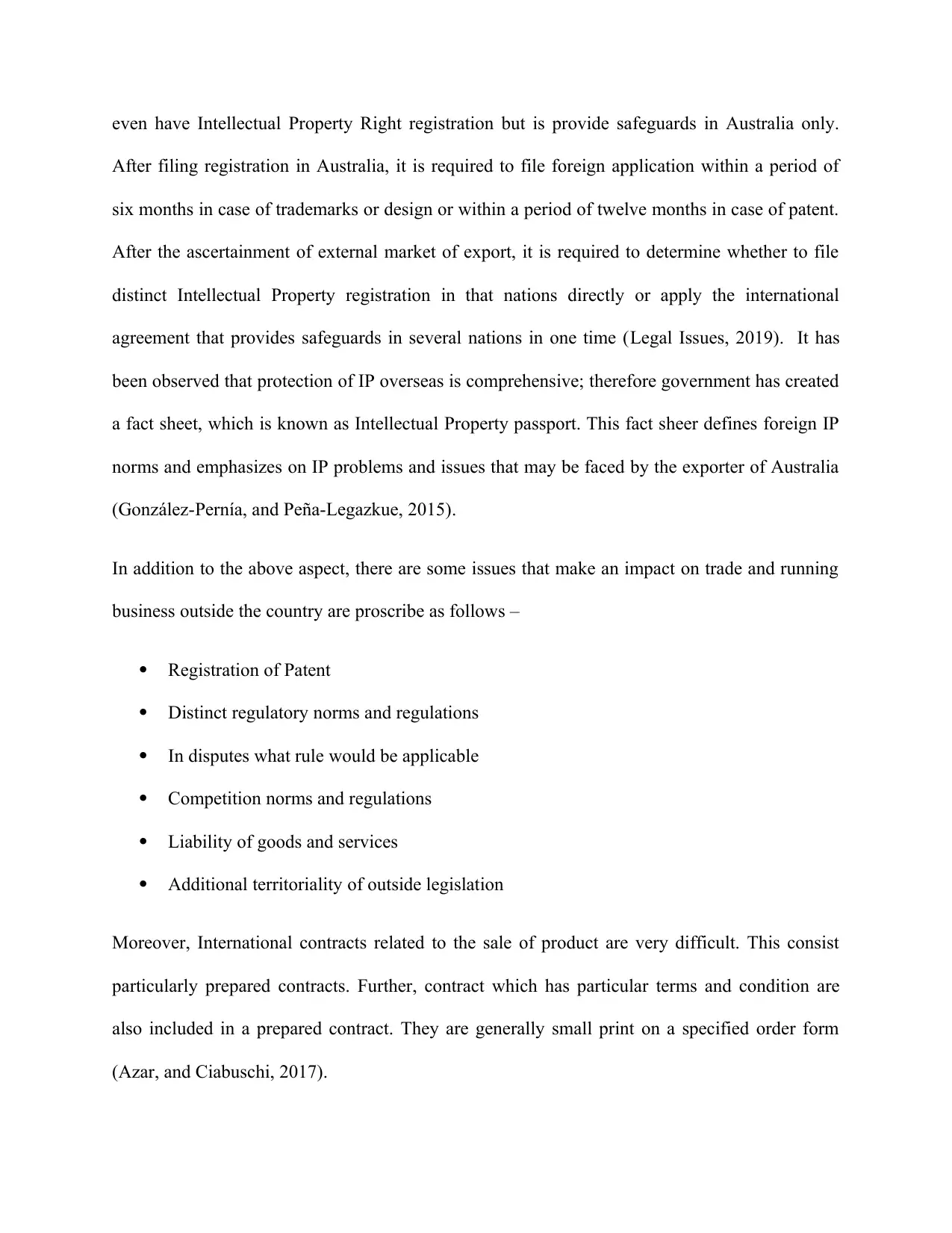
even have Intellectual Property Right registration but is provide safeguards in Australia only.
After filing registration in Australia, it is required to file foreign application within a period of
six months in case of trademarks or design or within a period of twelve months in case of patent.
After the ascertainment of external market of export, it is required to determine whether to file
distinct Intellectual Property registration in that nations directly or apply the international
agreement that provides safeguards in several nations in one time (Legal Issues, 2019). It has
been observed that protection of IP overseas is comprehensive; therefore government has created
a fact sheet, which is known as Intellectual Property passport. This fact sheer defines foreign IP
norms and emphasizes on IP problems and issues that may be faced by the exporter of Australia
(González-Pernía, and Peña-Legazkue, 2015).
In addition to the above aspect, there are some issues that make an impact on trade and running
business outside the country are proscribe as follows –
Registration of Patent
Distinct regulatory norms and regulations
In disputes what rule would be applicable
Competition norms and regulations
Liability of goods and services
Additional territoriality of outside legislation
Moreover, International contracts related to the sale of product are very difficult. This consist
particularly prepared contracts. Further, contract which has particular terms and condition are
also included in a prepared contract. They are generally small print on a specified order form
(Azar, and Ciabuschi, 2017).
After filing registration in Australia, it is required to file foreign application within a period of
six months in case of trademarks or design or within a period of twelve months in case of patent.
After the ascertainment of external market of export, it is required to determine whether to file
distinct Intellectual Property registration in that nations directly or apply the international
agreement that provides safeguards in several nations in one time (Legal Issues, 2019). It has
been observed that protection of IP overseas is comprehensive; therefore government has created
a fact sheet, which is known as Intellectual Property passport. This fact sheer defines foreign IP
norms and emphasizes on IP problems and issues that may be faced by the exporter of Australia
(González-Pernía, and Peña-Legazkue, 2015).
In addition to the above aspect, there are some issues that make an impact on trade and running
business outside the country are proscribe as follows –
Registration of Patent
Distinct regulatory norms and regulations
In disputes what rule would be applicable
Competition norms and regulations
Liability of goods and services
Additional territoriality of outside legislation
Moreover, International contracts related to the sale of product are very difficult. This consist
particularly prepared contracts. Further, contract which has particular terms and condition are
also included in a prepared contract. They are generally small print on a specified order form
(Azar, and Ciabuschi, 2017).
Paraphrase This Document
Need a fresh take? Get an instant paraphrase of this document with our AI Paraphraser
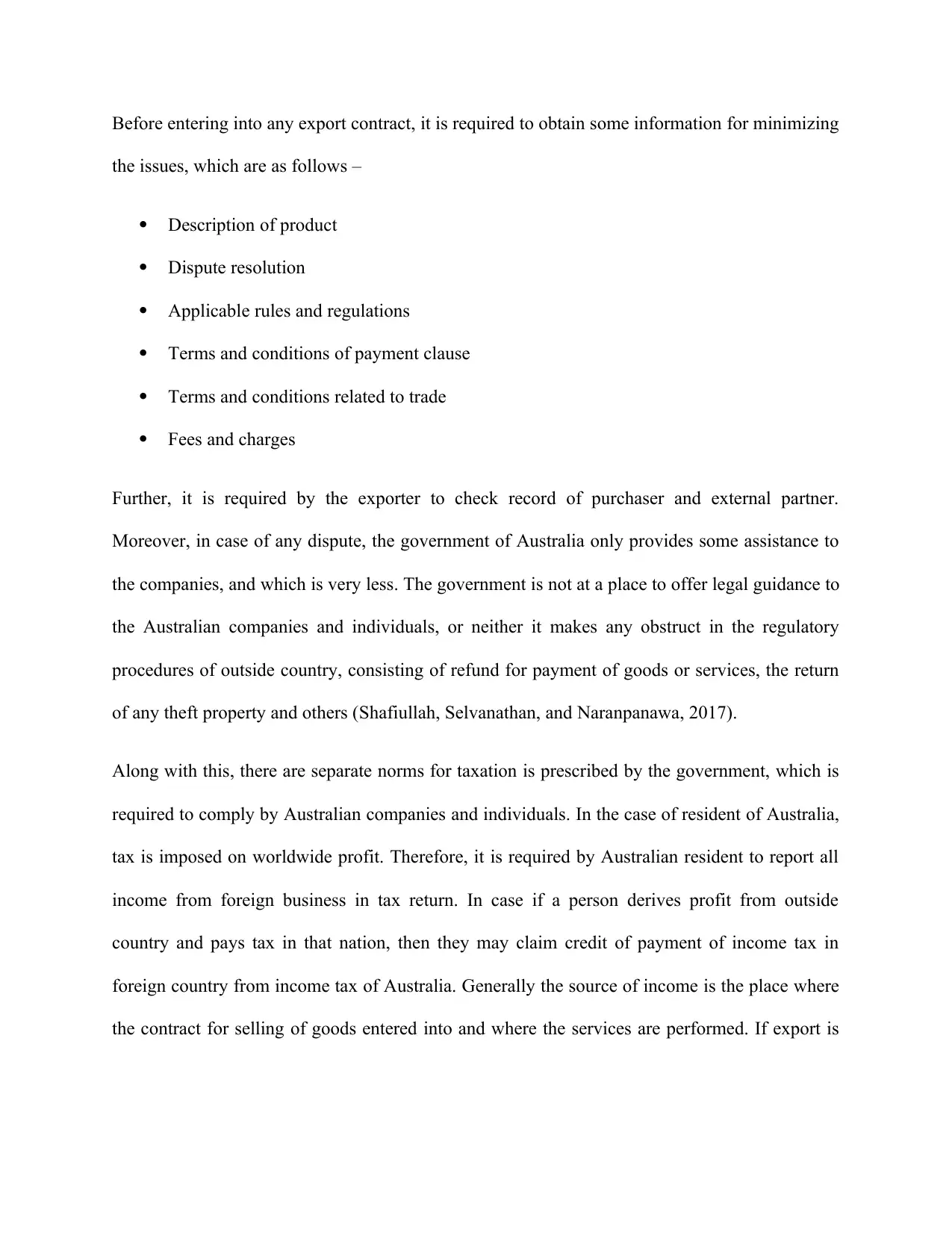
Before entering into any export contract, it is required to obtain some information for minimizing
the issues, which are as follows –
Description of product
Dispute resolution
Applicable rules and regulations
Terms and conditions of payment clause
Terms and conditions related to trade
Fees and charges
Further, it is required by the exporter to check record of purchaser and external partner.
Moreover, in case of any dispute, the government of Australia only provides some assistance to
the companies, and which is very less. The government is not at a place to offer legal guidance to
the Australian companies and individuals, or neither it makes any obstruct in the regulatory
procedures of outside country, consisting of refund for payment of goods or services, the return
of any theft property and others (Shafiullah, Selvanathan, and Naranpanawa, 2017).
Along with this, there are separate norms for taxation is prescribed by the government, which is
required to comply by Australian companies and individuals. In the case of resident of Australia,
tax is imposed on worldwide profit. Therefore, it is required by Australian resident to report all
income from foreign business in tax return. In case if a person derives profit from outside
country and pays tax in that nation, then they may claim credit of payment of income tax in
foreign country from income tax of Australia. Generally the source of income is the place where
the contract for selling of goods entered into and where the services are performed. If export is
the issues, which are as follows –
Description of product
Dispute resolution
Applicable rules and regulations
Terms and conditions of payment clause
Terms and conditions related to trade
Fees and charges
Further, it is required by the exporter to check record of purchaser and external partner.
Moreover, in case of any dispute, the government of Australia only provides some assistance to
the companies, and which is very less. The government is not at a place to offer legal guidance to
the Australian companies and individuals, or neither it makes any obstruct in the regulatory
procedures of outside country, consisting of refund for payment of goods or services, the return
of any theft property and others (Shafiullah, Selvanathan, and Naranpanawa, 2017).
Along with this, there are separate norms for taxation is prescribed by the government, which is
required to comply by Australian companies and individuals. In the case of resident of Australia,
tax is imposed on worldwide profit. Therefore, it is required by Australian resident to report all
income from foreign business in tax return. In case if a person derives profit from outside
country and pays tax in that nation, then they may claim credit of payment of income tax in
foreign country from income tax of Australia. Generally the source of income is the place where
the contract for selling of goods entered into and where the services are performed. If export is
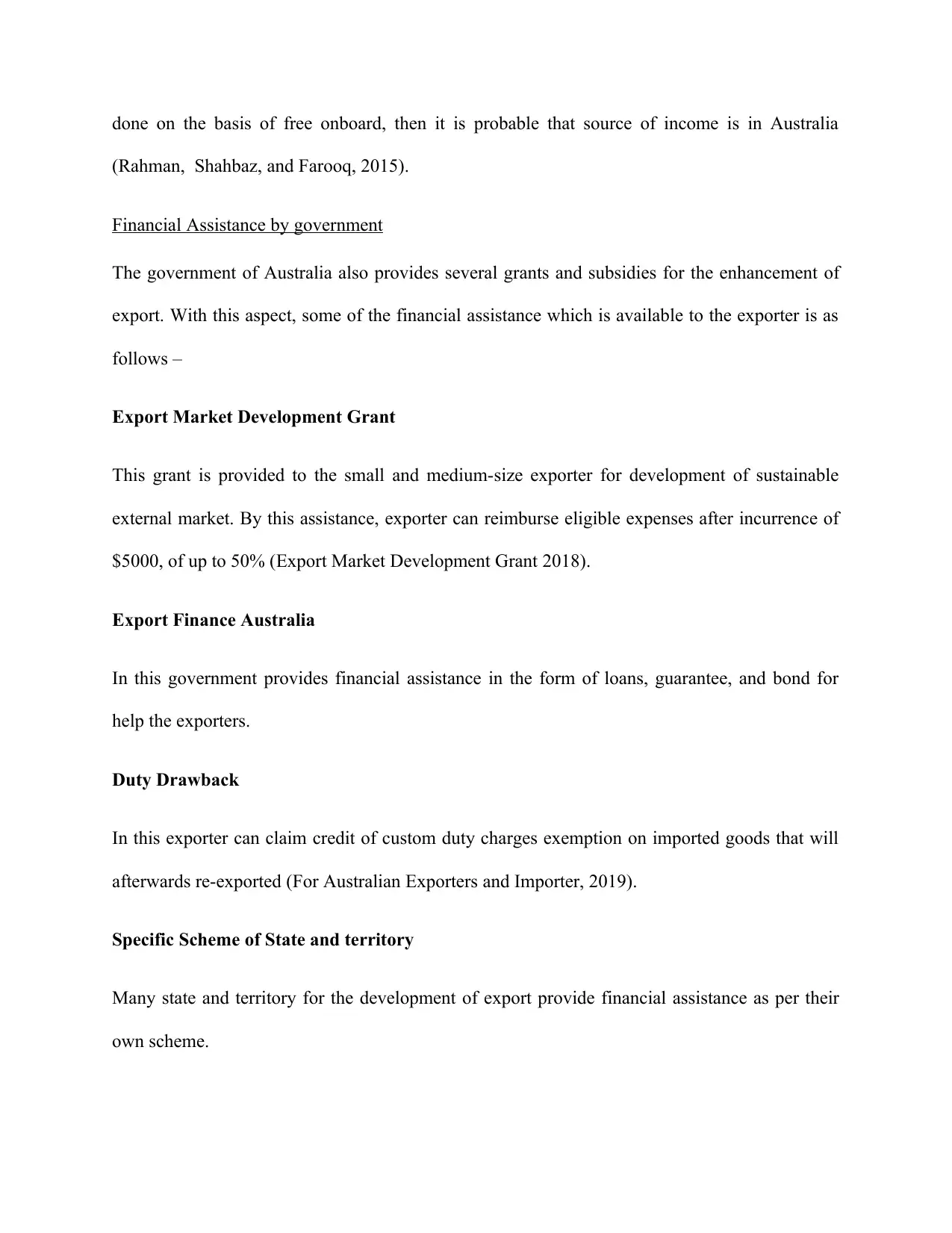
done on the basis of free onboard, then it is probable that source of income is in Australia
(Rahman, Shahbaz, and Farooq, 2015).
Financial Assistance by government
The government of Australia also provides several grants and subsidies for the enhancement of
export. With this aspect, some of the financial assistance which is available to the exporter is as
follows –
Export Market Development Grant
This grant is provided to the small and medium-size exporter for development of sustainable
external market. By this assistance, exporter can reimburse eligible expenses after incurrence of
$5000, of up to 50% (Export Market Development Grant 2018).
Export Finance Australia
In this government provides financial assistance in the form of loans, guarantee, and bond for
help the exporters.
Duty Drawback
In this exporter can claim credit of custom duty charges exemption on imported goods that will
afterwards re-exported (For Australian Exporters and Importer, 2019).
Specific Scheme of State and territory
Many state and territory for the development of export provide financial assistance as per their
own scheme.
(Rahman, Shahbaz, and Farooq, 2015).
Financial Assistance by government
The government of Australia also provides several grants and subsidies for the enhancement of
export. With this aspect, some of the financial assistance which is available to the exporter is as
follows –
Export Market Development Grant
This grant is provided to the small and medium-size exporter for development of sustainable
external market. By this assistance, exporter can reimburse eligible expenses after incurrence of
$5000, of up to 50% (Export Market Development Grant 2018).
Export Finance Australia
In this government provides financial assistance in the form of loans, guarantee, and bond for
help the exporters.
Duty Drawback
In this exporter can claim credit of custom duty charges exemption on imported goods that will
afterwards re-exported (For Australian Exporters and Importer, 2019).
Specific Scheme of State and territory
Many state and territory for the development of export provide financial assistance as per their
own scheme.
⊘ This is a preview!⊘
Do you want full access?
Subscribe today to unlock all pages.

Trusted by 1+ million students worldwide
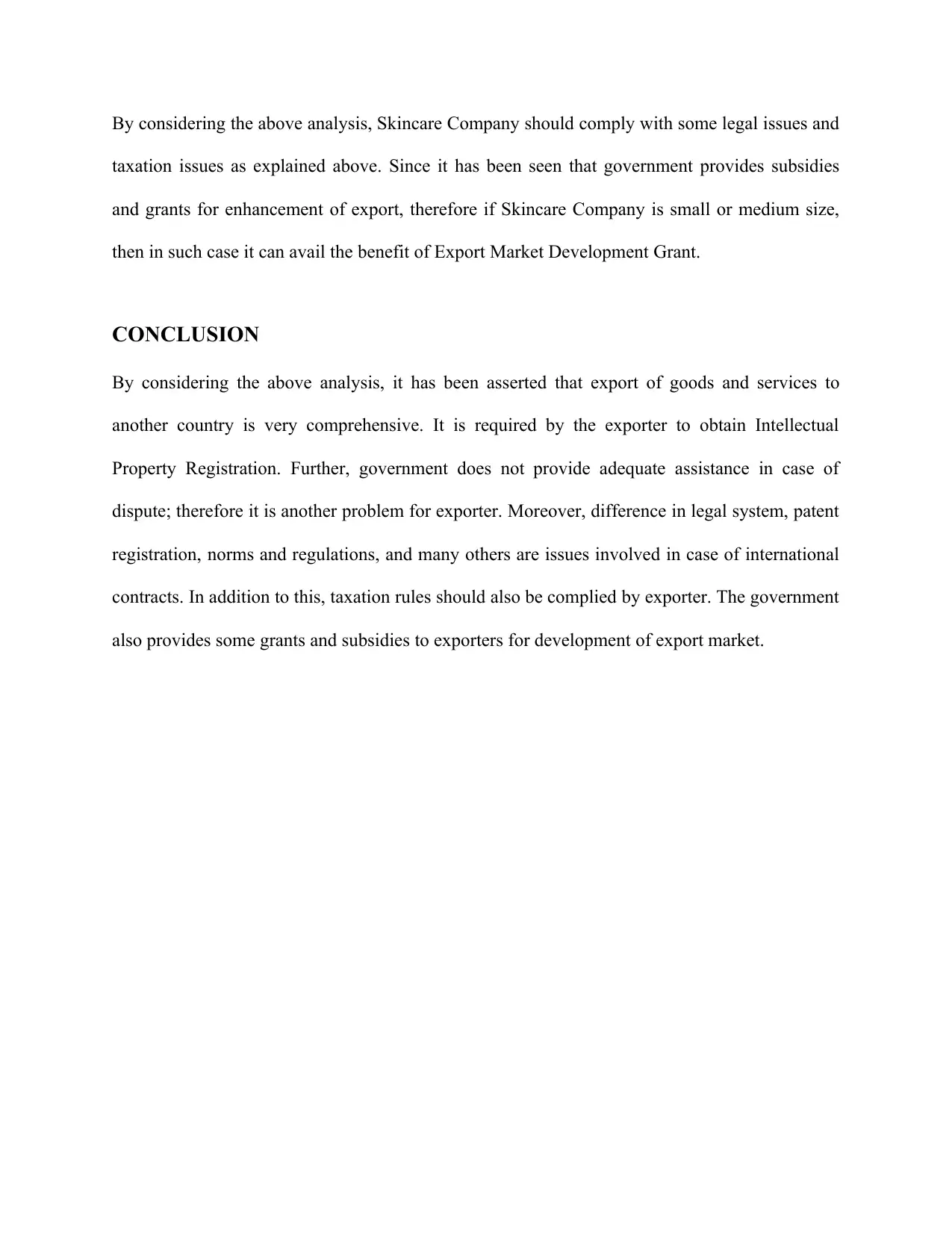
By considering the above analysis, Skincare Company should comply with some legal issues and
taxation issues as explained above. Since it has been seen that government provides subsidies
and grants for enhancement of export, therefore if Skincare Company is small or medium size,
then in such case it can avail the benefit of Export Market Development Grant.
CONCLUSION
By considering the above analysis, it has been asserted that export of goods and services to
another country is very comprehensive. It is required by the exporter to obtain Intellectual
Property Registration. Further, government does not provide adequate assistance in case of
dispute; therefore it is another problem for exporter. Moreover, difference in legal system, patent
registration, norms and regulations, and many others are issues involved in case of international
contracts. In addition to this, taxation rules should also be complied by exporter. The government
also provides some grants and subsidies to exporters for development of export market.
taxation issues as explained above. Since it has been seen that government provides subsidies
and grants for enhancement of export, therefore if Skincare Company is small or medium size,
then in such case it can avail the benefit of Export Market Development Grant.
CONCLUSION
By considering the above analysis, it has been asserted that export of goods and services to
another country is very comprehensive. It is required by the exporter to obtain Intellectual
Property Registration. Further, government does not provide adequate assistance in case of
dispute; therefore it is another problem for exporter. Moreover, difference in legal system, patent
registration, norms and regulations, and many others are issues involved in case of international
contracts. In addition to this, taxation rules should also be complied by exporter. The government
also provides some grants and subsidies to exporters for development of export market.
Paraphrase This Document
Need a fresh take? Get an instant paraphrase of this document with our AI Paraphraser
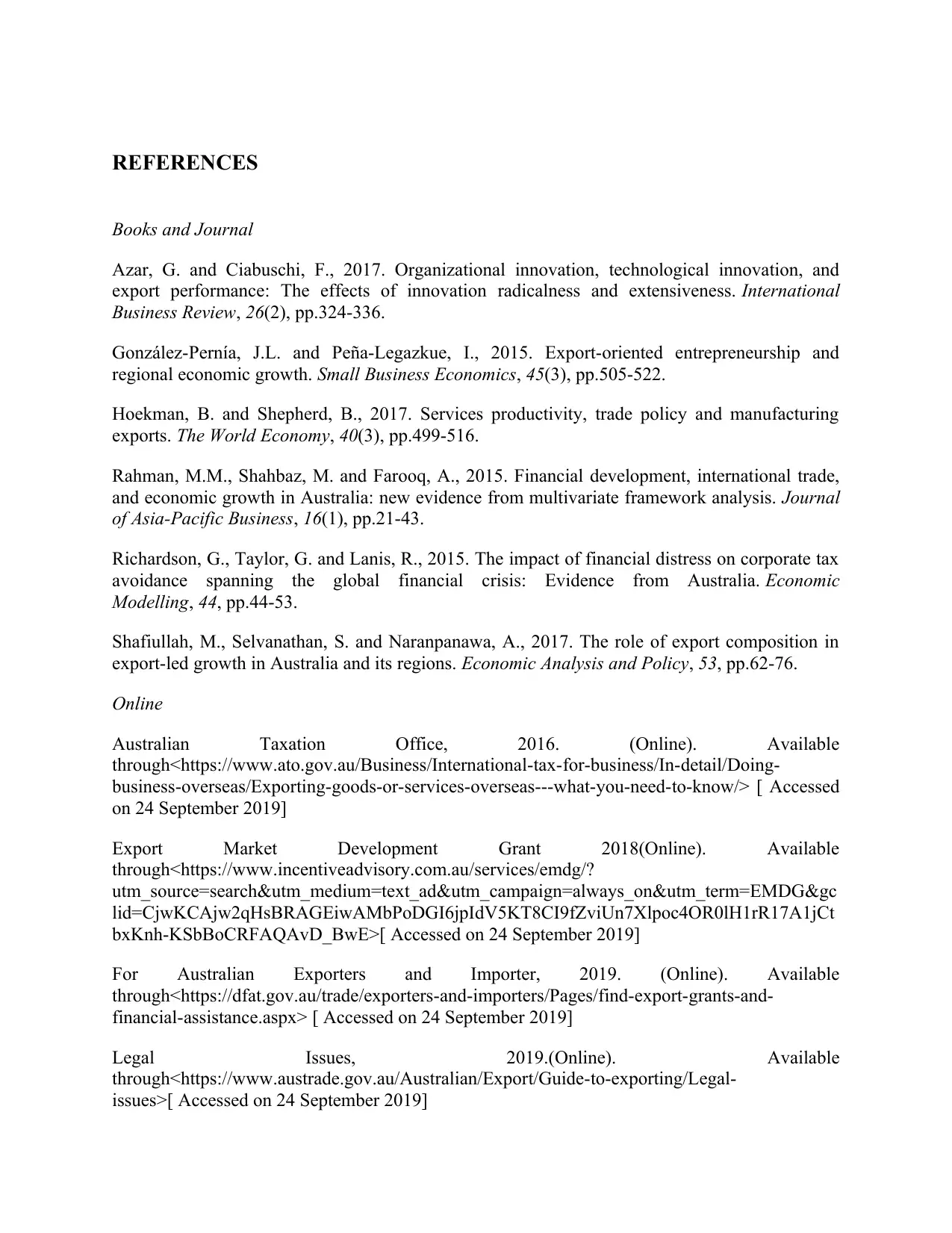
REFERENCES
Books and Journal
Azar, G. and Ciabuschi, F., 2017. Organizational innovation, technological innovation, and
export performance: The effects of innovation radicalness and extensiveness. International
Business Review, 26(2), pp.324-336.
González-Pernía, J.L. and Peña-Legazkue, I., 2015. Export-oriented entrepreneurship and
regional economic growth. Small Business Economics, 45(3), pp.505-522.
Hoekman, B. and Shepherd, B., 2017. Services productivity, trade policy and manufacturing
exports. The World Economy, 40(3), pp.499-516.
Rahman, M.M., Shahbaz, M. and Farooq, A., 2015. Financial development, international trade,
and economic growth in Australia: new evidence from multivariate framework analysis. Journal
of Asia-Pacific Business, 16(1), pp.21-43.
Richardson, G., Taylor, G. and Lanis, R., 2015. The impact of financial distress on corporate tax
avoidance spanning the global financial crisis: Evidence from Australia. Economic
Modelling, 44, pp.44-53.
Shafiullah, M., Selvanathan, S. and Naranpanawa, A., 2017. The role of export composition in
export-led growth in Australia and its regions. Economic Analysis and Policy, 53, pp.62-76.
Online
Australian Taxation Office, 2016. (Online). Available
through<https://www.ato.gov.au/Business/International-tax-for-business/In-detail/Doing-
business-overseas/Exporting-goods-or-services-overseas---what-you-need-to-know/> [ Accessed
on 24 September 2019]
Export Market Development Grant 2018(Online). Available
through<https://www.incentiveadvisory.com.au/services/emdg/?
utm_source=search&utm_medium=text_ad&utm_campaign=always_on&utm_term=EMDG&gc
lid=CjwKCAjw2qHsBRAGEiwAMbPoDGI6jpIdV5KT8CI9fZviUn7Xlpoc4OR0lH1rR17A1jCt
bxKnh-KSbBoCRFAQAvD_BwE>[ Accessed on 24 September 2019]
For Australian Exporters and Importer, 2019. (Online). Available
through<https://dfat.gov.au/trade/exporters-and-importers/Pages/find-export-grants-and-
financial-assistance.aspx> [ Accessed on 24 September 2019]
Legal Issues, 2019.(Online). Available
through<https://www.austrade.gov.au/Australian/Export/Guide-to-exporting/Legal-
issues>[ Accessed on 24 September 2019]
Books and Journal
Azar, G. and Ciabuschi, F., 2017. Organizational innovation, technological innovation, and
export performance: The effects of innovation radicalness and extensiveness. International
Business Review, 26(2), pp.324-336.
González-Pernía, J.L. and Peña-Legazkue, I., 2015. Export-oriented entrepreneurship and
regional economic growth. Small Business Economics, 45(3), pp.505-522.
Hoekman, B. and Shepherd, B., 2017. Services productivity, trade policy and manufacturing
exports. The World Economy, 40(3), pp.499-516.
Rahman, M.M., Shahbaz, M. and Farooq, A., 2015. Financial development, international trade,
and economic growth in Australia: new evidence from multivariate framework analysis. Journal
of Asia-Pacific Business, 16(1), pp.21-43.
Richardson, G., Taylor, G. and Lanis, R., 2015. The impact of financial distress on corporate tax
avoidance spanning the global financial crisis: Evidence from Australia. Economic
Modelling, 44, pp.44-53.
Shafiullah, M., Selvanathan, S. and Naranpanawa, A., 2017. The role of export composition in
export-led growth in Australia and its regions. Economic Analysis and Policy, 53, pp.62-76.
Online
Australian Taxation Office, 2016. (Online). Available
through<https://www.ato.gov.au/Business/International-tax-for-business/In-detail/Doing-
business-overseas/Exporting-goods-or-services-overseas---what-you-need-to-know/> [ Accessed
on 24 September 2019]
Export Market Development Grant 2018(Online). Available
through<https://www.incentiveadvisory.com.au/services/emdg/?
utm_source=search&utm_medium=text_ad&utm_campaign=always_on&utm_term=EMDG&gc
lid=CjwKCAjw2qHsBRAGEiwAMbPoDGI6jpIdV5KT8CI9fZviUn7Xlpoc4OR0lH1rR17A1jCt
bxKnh-KSbBoCRFAQAvD_BwE>[ Accessed on 24 September 2019]
For Australian Exporters and Importer, 2019. (Online). Available
through<https://dfat.gov.au/trade/exporters-and-importers/Pages/find-export-grants-and-
financial-assistance.aspx> [ Accessed on 24 September 2019]
Legal Issues, 2019.(Online). Available
through<https://www.austrade.gov.au/Australian/Export/Guide-to-exporting/Legal-
issues>[ Accessed on 24 September 2019]

⊘ This is a preview!⊘
Do you want full access?
Subscribe today to unlock all pages.

Trusted by 1+ million students worldwide
1 out of 9
Related Documents
Your All-in-One AI-Powered Toolkit for Academic Success.
+13062052269
info@desklib.com
Available 24*7 on WhatsApp / Email
![[object Object]](/_next/static/media/star-bottom.7253800d.svg)
Unlock your academic potential
Copyright © 2020–2026 A2Z Services. All Rights Reserved. Developed and managed by ZUCOL.





